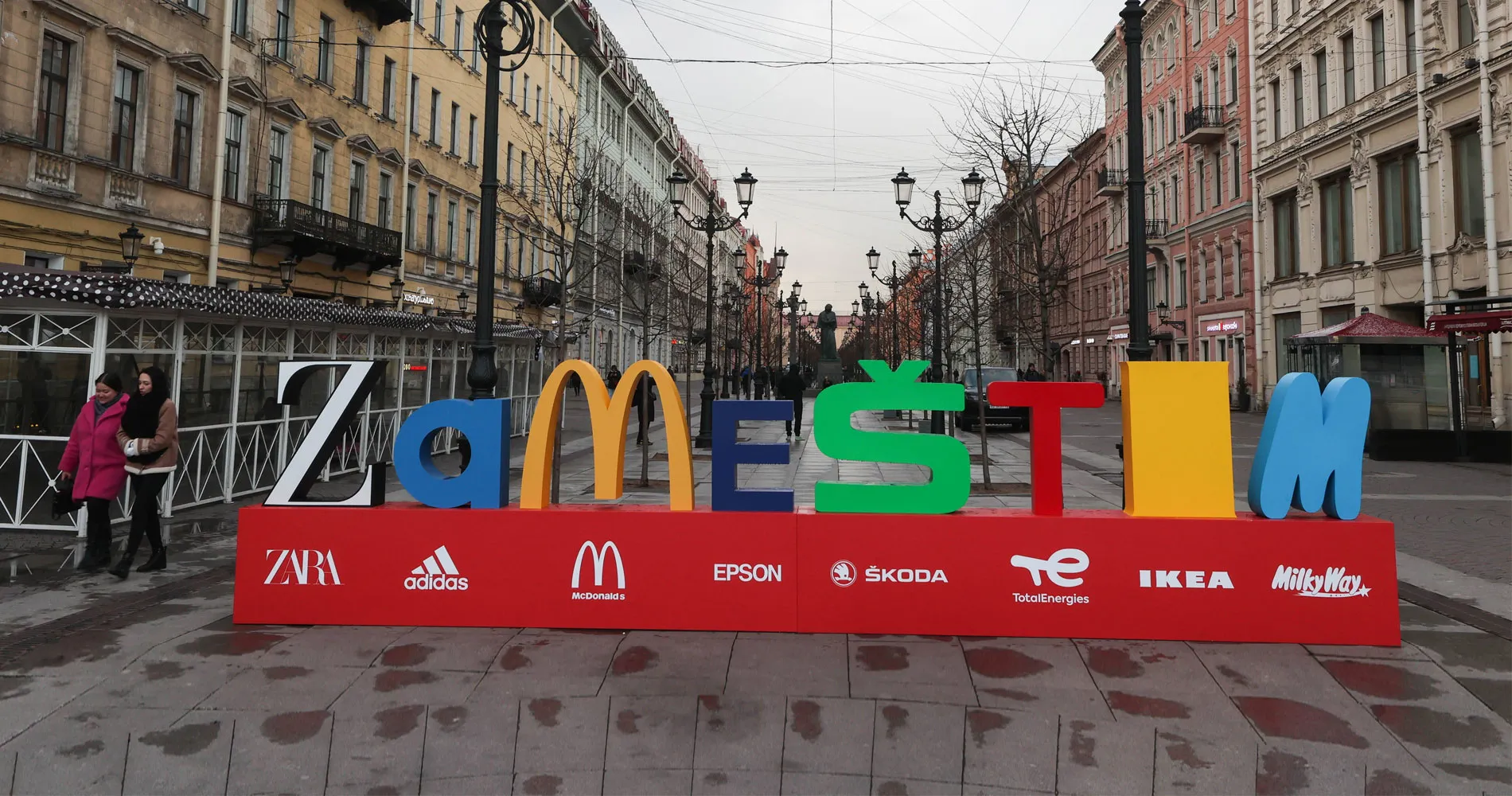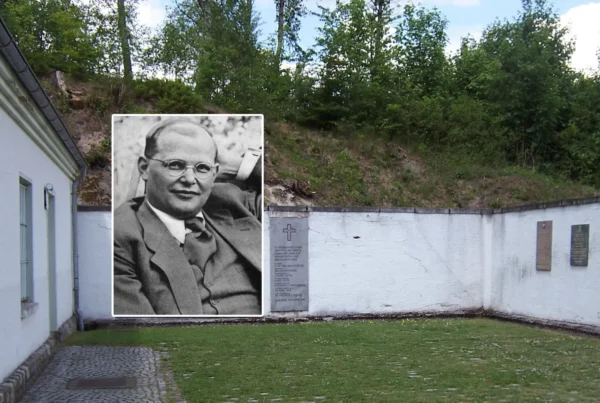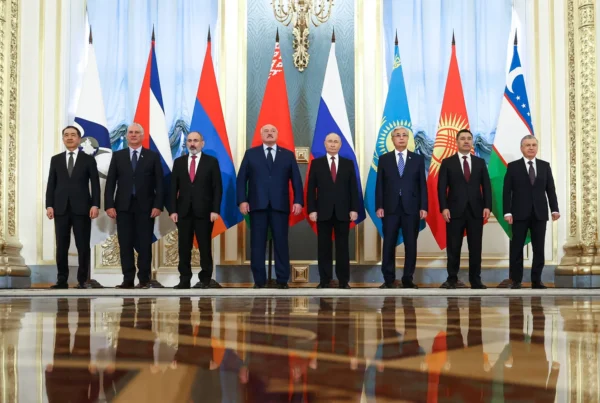Russia has faced the biggest wave of Western economic sanctions in its history. Many Western companies announced their withdrawal from the Russian market to show solidarity with Ukraine and as a result of external pressure. Yet two years into the conflict, it is apparent that not all brands left the country. The public announcements of withdrawal were often rather symbolic and not reflecting complex realities on the ground.
Murat Gibadyukov
30 October 2024
Arabic version | Chinese version | French version | German version
Following the “Special Military Operation” (SMO) against Ukraine in 2022, the West started its wave of sanctions against Russia. Today, Russia is faced with the biggest wave of economic sanctions in its history. How has Russian business adapted after two years of sanctions? And, how many western businesses have truly “exited” Russia?
One of the most common strategies employed by many companies was to sell their business to local operators. This allowed them to maintain a presence in the market, even if on the surface it looked like a complete cessation of operations. An iconic example is the departure of the McDonald’s restaurant chain. In 2022, the company loudly announced the sale of all its assets in Russia. However, in a few months the restaurants opened under the new brand “Вкусно и Точка” (Vkusno I Tochka, direct translation – Tasty and that’s it). The basic model of work, the menu and even the staff remained virtually unchanged. This suggests that it was more a question of changing the signboard than a complete withdrawal from the market.
A similar situation occurred with other international brands. For example, the Starbucks coffee chain also sold its assets in Russia. The new owners rebranded the establishments, but the business itself continued to operate on the same basis. These cases show that even when international companies seem to be leaving, they retain a significant part of their presence by transferring business to local players.
Another common strategy is the use of franchising schemes. Franchising allows large international corporations to transfer their brands and business models to independent partners in different countries. Under the conditions of sanctions pressure, this model has become even more in demand. Companies that announced their withdrawal retained the opportunity to indirectly manage their business through local franchise partners. Thus, brands that have officially left the Russian market can still be found in the windows of shopping centers and on the streets of cities.
This approach is particularly active in the retail and catering sectors. International chains continue to operate through license agreements that allow Russian entrepreneurs to retain their original business formats. In such cases, companies may claim that they are no longer directly present on the market, although their products and services are still available to consumers. For example, Burger King fast food restaurant chain remains on the Russian market, as most of the restaurants are owned by local franchisees and the management company cannot terminate their operations. In the hotel business, the situation is similar: major chains such as Marriott and Hilton continue to be present in Russia through franchises, where hotels are managed by independent operators, despite corporate decisions to suspend operations.
Parallel imports have gained special significance in the context of sanctions and the withdrawal of foreign brands. This is a mechanism whereby goods from foreign companies are imported into the country via third countries without the official consent of the manufacturer or its representatives. After sanctions were imposed and a number of companies announced their withdrawal, the Russian government legalized this practice, allowing them to retain access to a wide range of international goods.
Parallel imports have become an important tool, especially in areas such as electronics, cars and clothing. For example, despite Apple’s official withdrawal, its products continue to enter Russia through distributors in Turkey, Kazakhstan and other countries that do not support sanctions. BMW and Mercedes cars are also still available on the Russian market thanks to deliveries through intermediaries. The situation is similar for a number of consumer goods, including clothing and cosmetics.
Thus, the withdrawal of international companies did not lead to a shortage of their products. Parallel imports maintain market supply, although prices for such goods are often higher owing to additional logistics costs and duties.
Some companies have found other ways to maintain their presence in the Russian market while avoiding direct involvement. Despite officially closing their business, they continue to generate revenue through license agreements, royalties or other types of contractual obligations. In such cases, companies retain their intellectual property and benefit without directly managing the business. For example, Nestlé, which has announced that it is winding down a significant part of its business, continues to generate revenue through partner agreements and license payments. The situation is similar for cosmetics manufacturer L’Oréal, which has reduced its operations in Russia but retained supply channels through local distributors. In the automotive industry, companies such as Toyota and Volkswagen, having suspended production and direct sales, continue to generate revenues through the supply of spare parts and service organized by local partners.
In some cases, brands even legally remain owners of their assets, but transfer management to local companies, thus circumventing sanctions and maintaining operations. This allows them to minimize losses and maintain their influence in the Russian market without violating their legal obligations to the countries supporting the sanctions.
“What’s in a Name?” Western companies have found ways to circumvent sanctions and remain in Russia using different company names and legal contructs. In William Shakespeare’s Romeo and Juliet, his female protagonist made the famous statement which has entered into the English language as an everyday idiom: “What’s in a Name?” Juliet was talking about her love Romeo and that she did not care what his name was. The play centered on the feud between the two families Montague and Capulet. Romeo would be the same wonderful guy without his name. The idiom has come to mean that a name in itself does not hold intrinsic value or define the essence of an entity or person. Similarly, the name by which western companies are now operating in Russia has become secondary to the products, goods and services they are distributing.
Although announcements about the mass withdrawal of foreign companies from Russia have become an important element of economic pressure on the country, in practice many of them have continued to operate through various schemes. Asset sales, franchising and parallel imports have allowed Western brands to maintain a significant presence in the Russian market, although in a slightly modified form. This demonstrates that global economic ties are so complex and interdependent that a complete breakdown of relations between countries is difficult to achieve, even in the face of sanctions and political pressure.







